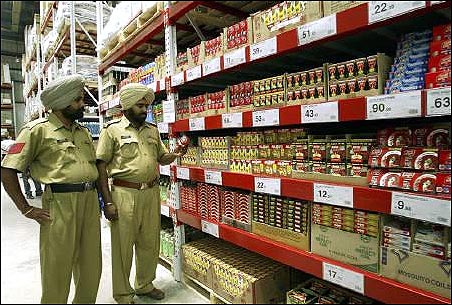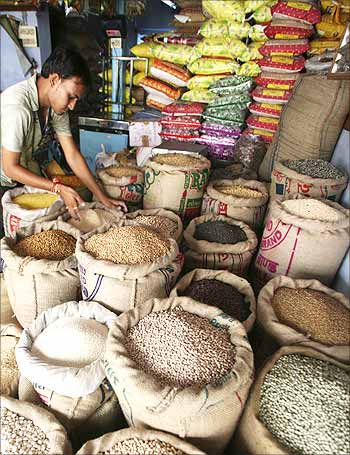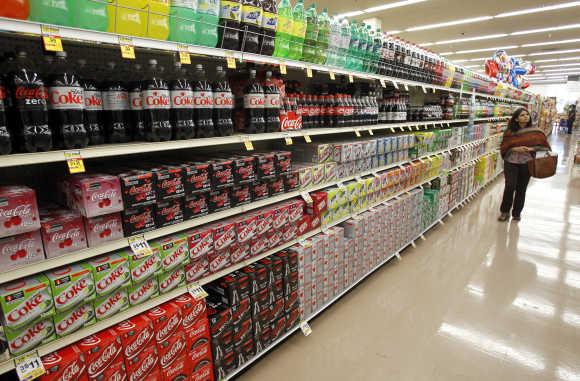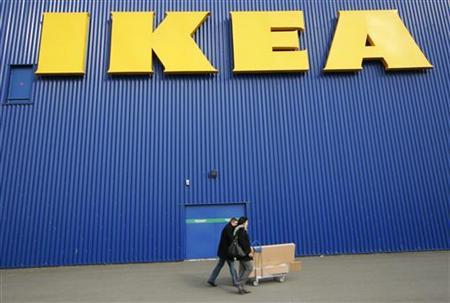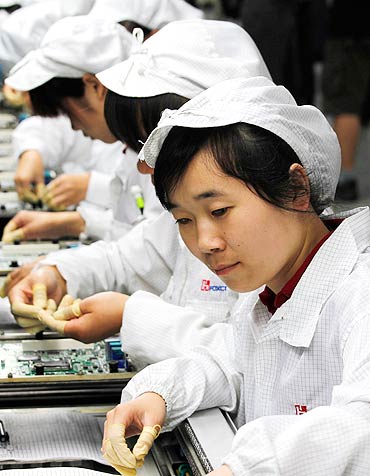 | « Back to article | Print this article |
For every job Walmart creates, 17 will be unemployed
Imagine a society where 80 percent of grocery sales are monopolised by just five giant retailers like Walmart, Tesco and Carrefour, where locally grown fresh food is largely replaced by processed, plastic-packaged items with low nutritional value, and where great heterogeneity of attire based on traditional and ethnic fabrics is gradually destroyed-and so-called "consumer choice" is reduced to competition between a handful of brands and logos.
Most Indians would rightly consider this a nightmare scenario because of the artificial, chemicals- and energy-intensive nature of the products sold and the corporate manipulation of people's tastes and choices involved.
But it's not very far from what has happened in much of Western Europe and North America over the past 30 years, especially as regards groceries, clothes and shoes, and increasingly, fruits and vegetables.
Click NEXT to read more...
For every job Walmart creates, 17 will be unemployed
Yet, that's the trajectory on to which Prime Minister Manmohan Singh has pushed this wretchedly poor country by permitting 51 percent foreign direct investment in multi-brand retail as part of a strategy to boost GDP growth by feeding the "animal spirits" of entrepreneurs, in this case foreign entrepreneurs like Walmart, which is among the world's most hated corporations.
This decision, on which the government had stalled despite Cabinet approval last November because of internal dissent and fear of a popular backlash, will go down as one of the most insidiously destructive economic measures ever taken in India.
It will lead to the relentless undermining of the livelihoods of millions of petty traders, kirana shop-owners, vendors and hawkers, with minuscule benefits, limited to global capital and India's urban elite, which is already addicted to glitzy energy-guzzling shopping malls.
Click NEXT to read more...
For every job Walmart creates, 17 will be unemployed
So great is this addiction that when Uttar Pradesh, faced with a crippling power shortage in June, imposed a 7 pm closing-time for malls, it faced a virtual revolt and had to rescind its decision.
The retail FDI decision is rooted in the bravado of a leader who scarcely cares for his own people, especially the poor, but is deeply ashamed at being called an "underachiever" by the West.
So he has signalled his unwavering commitment to serving the interests of transnational corporations (TNCs) through brazenly partisan neoliberal policies, just as these stand utterly discredited in the world.
Dr Singh will make not just the United Progressive Alliance, but the Indian nation, pay a heavy price for this.
The Congress, which is foolishly indulging him, will soon find that he has become a great liability. He has wantonly provoked the Trinamool Congress to walk out of the UPA and weakened his government's credibility.
Click NEXT to read more...
For every job Walmart creates, 17 will be unemployed
Each of the arguments cited by the government for opening up retail trade to TNC-owned supermarket chains is wrong and reeks of dishonesty-including creation of new jobs, elimination of middlemen, better prices for farmers, and benefits to consumers through lower product prices.
Consider the pertinent facts. The volume of retail and wholesale trade in India is about $450 billion. The sector employs a huge number of people, estimated at 44 million in the latest National Sample Survey.
Many of them will lose their jobs as TNCs intrude into trade and create very few new jobs. Experience in Thailand, Malaysia, Indonesia and Brazil confirms this.
Click NEXT to read more...
For every job Walmart creates, 17 will be unemployed
Walmart, for instance, has a global turnover ($420 billion) comparable to the Indian trade sector's, but employs only 2.1 million, or 20 times fewer people.
For every new job it creates in India, at least 17 workers will lose employment. In general, given the large size and economies of scale in organised retail, and its capital intensity, new job generation would be puny, and in no way compensate for the number who will be displaced.
At grave risk are millions of petty grocers, vegetable sellers, street vendors, owners of corner-shops selling everything from matches to garments to crockery to hardware, and dirt-poor kabadiwalas who contribute greatly to this society by recycling waste and reducing carbon dioxide emissions, which cause dangerous climate change.
Click NEXT to read more...
For every job Walmart creates, 17 will be unemployed
The managing director of German trader Metro Cash& Carry, which runs 11 large distribution centres in different Indian cities, candidly admits this.
The experience with organised retail, which was recently opened up to corporations like Big Bazaar and Reliance, demonstrates the harm caused to some of the most vulnerable people of the country. Corporate retailers routinely resort to predatory or below-cost pricing to attract customers initially-only to jack up prices later, eventually transferring the burden to the consumer.
The entry of TNCs, which have deep pockets and can absorb big initial losses, will only deepen market distortions, and increase excessive concentration and non-competitive practices.
Click NEXT to read more...
For every job Walmart creates, 17 will be unemployed
It won't eliminate middlemen, but introduce new ones, such as buying agents, processors, packagers, standardisers, quality checkers, and certification firms and all kinds of corporate consultants.
Farmers and other suppliers will become vulnerable to manipulative and monopolistic practices of the TNC chains, which run supermarkets with a typical shopping area of 40,000 square feet, and hypermarkets (80,000 to 200,000 sq ft).
Suppliers have very little bargaining power vis-a-vis the TNCs, which can beat them down on prices through harsh negotiations and threats of de-listing.
Fears of abuse of the "buyer power" of giant retailers aren't imaginary. A report by the Centre for Research on Multinational Corporations, a part of the Agribusiness Accountability Initiative, shows widespread abuse in the European Union.
Click NEXT to read more...
For every job Walmart creates, 17 will be unemployed
Supermarket chains tend to reduce "the number of suppliers to a few or just one" and require that they "do not sell at lower prices to competitors".
They extract the lowest possible prices from suppliers, while imposing all kinds of fees and extra payments on them.
These include "retro-active payments", such as costs of advertisements and renewal of stores, "sometimes outside contractual arrangements or without assent from the suppliers", "payments to be able to supply to, and be on the shelves of, supermarkets (listing fees, slotting fees)", and "late payments which enable supermarkets to gain profits at the expense of suppliers".
Click NEXT to read more...
For every job Walmart creates, 17 will be unemployed
These payments can add up to a high 50 percent of the suppliers' revenues in Italy, and even 70 per cent in France.
"As a result, some suppliers have gone under .... This survey found that small and medium enterprises (SMEs) in the food sector and farmers have been especially vulnerable." So much for a fair deal for farmers!
Many supermarkets increasingly sell goods under "private labels", that is, products with their own brand labels. This is claimed as a new opportunity for suppliers. These products are mostly cheaper.
But supermarkets can threaten both branded product suppliers and private label producers with de-listing. They alone decide "what products are sold" and hold all the trump cards.
Click NEXT to read more...
For every job Walmart creates, 17 will be unemployed
Also, "supermarkets can easily replace producers of their private label goods and ... can thus easily abuse their buyer power towards private label producers."
So "private labels" have become "an important additional element" of abuse-prone "buyer power", not a new opportunity for suppliers.
Many European countries have over the years witnessed a serious reduction in the number of "small independent retail stores as well as independent wholesalers, and a lack of opportunity for them to expand due to the collective dominance of a few supermarket chains. It has also resulted in growing concentration of buying arrangements..."
Click NEXT to read more...
For every job Walmart creates, 17 will be unemployed
In the long run, "buyer power" can and does affect consumer interests-not least through "decreasing choice and quality of products, lack of food available in local neighbourhoods, decreasing innovation of products for consumers, and increasing dependence on private labels".
No wonder supermarket prices, initially pitched low, soon catch up with open-market levels and overtake them by 20 to 30 percent, as the evidence from the world over demonstrates.
This evidence also suggests that it's impossible to secure compliance with conditions such as 30 percent sourcing from SMEs. Under World Trade Organisation rules, and the many bilateral cooperation treaties India has signed, these cannot be limited to national producers.
Click NEXT to read more...
For every job Walmart creates, 17 will be unemployed
In India, the condition has already been diluted to favour Swedish home-furnishings retailer Ikea.
Consumer choice decreases as supermarket concentration grows and the number of viable chains falls. When only a few buyers dominate the market, monopolies get formed quickly, allowing them to dictate terms
The giant retailers can steeply raise their profit margins and also resort to more and more unfair labour and industrial relations practices for which they are already notorious, including anti-union policies, ultra-low wages, and use of prison/bonded labour.
Click NEXT to read more...
For every job Walmart creates, 17 will be unemployed
They can increasingly source consumer durables like electronic goods from companies like Foxconn which runs 13 factories in China amidst appalling working conditions, such as a 12-hour working day with a six-day week.
Why, some of their Indian collaborators would be only too willing to supply similar products at ultra-low prices, provided labour laws are "liberalised" so they become "competitive" with Foxconn. This would spell a race to the bottom-and great social retrogression.
So at the end of the day, Dr Singh's FDI-in-retail policy will have achieved not higher GDP growth-the rise will probably be marginal-but large-scale destruction of livelihoods, and greater depredation on the most underprivileged and vulnerable people of this society.



